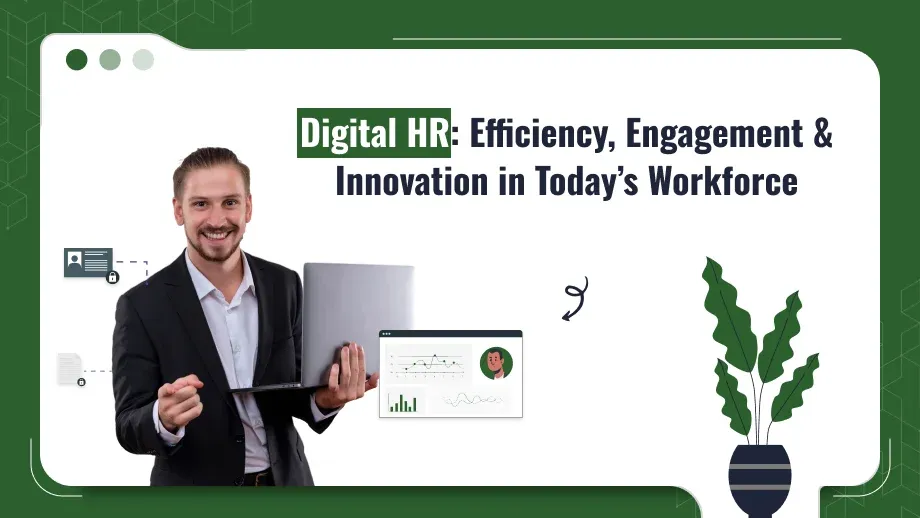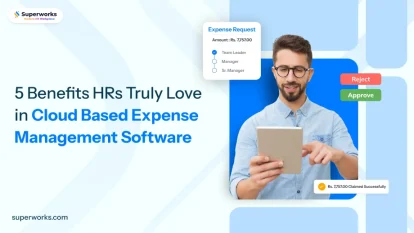
Intro: What is Digital HR and Why is it Important?
Digital HR is modernizing traditional HR practices using digital technology to improve efficiency, decision-making, and the experience of employees.Digital Human Resource Management (HRM) provides tools to improve the efficiency of HR tasks which range from the automated handling of processes like recruiting and payroll to the use of data to aid in workforce planning.
As the workforce changes, particularly in remote work and the globalization of recruitment of talent – the digital revolution in HR ensures that businesses remain relevant. In particular, digital HR provides efficiency as well as cost savings, and personal experience for employees. If you do not adopt the software, you’ll fall behind in this technologically driven world.
The 3 Pillars of Digital HR Transformation
Automation of HR Processes:
Automation is the foundation of digital transformation hr. Digital tools such as Software for HR application automatize routine tasks such as timesheet management as well as payroll and recruitment. The removal of manual tasks allows HR professionals to focus on the expansion of their business. For example, timesheet HRMS automates time tracking for employees to allow HR teams to monitor the productivity of employees in real-time and make sure that they comply with labor laws. Similar to application tracking software (ATS) helps streamline the hiring process, from post-employment announcements to evaluation of the applicant.
Improvement of Employee Experience:
Companies that seek to attract and keep top talent should focus on engagement of employees. Digital human resources enhances the user experience by offering self-service tools to help employees handle their HR duties including updating personal details, making requests for time off, and accessing information about benefits. Recognition programs for employees can help create an atmosphere of appreciation to enable employees to achieve their highest potential. According to the latest HR trends customized feedback in real-time, instant recognition, and access to learning resources through digital platforms help create a positive work environment and decrease the amount of time employees are working.
Data-Informed Decision-Making:
In a data driven world HR professionals must harness the power of HR analytics to make informed decisions. Analytics in HR gathers information on different aspects of performance in the workforce, including the satisfaction of employees rate, turnover, and the success of recruitment. These data help HR professionals forecast future workforce requirements to identify areas for improvement and improve their strategies for managing talent. Additionally, AI in HR statistics shows that artificial intelligence can be employed to analyze data from the workforce. For instance, AI technology can tell the employees who are most likely to leave, and HR departments can take preventive measures to increase retention.
Benefits of Digital Human Resources for Businesses
Increased Efficiency and Productivity:
With the help of automated HR processes, companies can see significant productivity improvements. Manual tasks such as benefits administration, payroll processing, and performance reviews can now be done more efficiently by using HRMS systems. These tools guarantee accuracy, minimize human error, and allow HR Tool to focus on important tasks such as leadership development and succession planning. A company that utilizes a cloud-based HRMS software The automation of payroll processing could guarantee that employees receive timely and precise payments. This approach reduces the likelihood of payroll inaccuracies and enhances adherence to labor and tax regulations.
Employee Engagement:
Engagement of employees is at the top of the agenda for many businesses because happy employees tend to be engaged and loyal. Platforms for managing Digital human resource management can help improve the engagement of employees by giving them accessibility to data and assistance. Through self-service portals, employees can control their own HR tasks such as checking the balance of their leave checking their pay slips, obtaining a pay stub, or opportunities for learning and development. This independence results in an engaged and empowered workforce. According to research from HR Operations businesses that invest in employee engagement tools that are digital have higher retention rates and higher satisfaction among employees.
Strategic HR Contributions:
Digital HR professionals can transition from an administrative job to a more strategic one. By utilizing data analytics and automation HR teams can help support the long-term goals of the business, such as creating a positive workplace culture, encouraging leadership capabilities, and aligning HR strategies to the needs of the company. For instance, the data-driven information of an HRMS platform could assist HR professionals to identify the gaps in their skills, studying the changes within working environments, as well as devise specific strategies to manage employees.
Challenges in Implementing Digital human resource management
Technological Challenges:
Implementing human resources can pose significant challenges, particularly for organizations utilizing outdated HR systems. The process of integrating new tools into the current infrastructure requires considerable time and resource investment. Selecting the best HRMS platform that meets the requirements of your company is vital. Many companies face difficulties in integrating innovative technologies, like artificial intelligence within human resource management or cloud-based systems for managing human resources into their existing workflows. Inappropriate technology can lead to inefficiencies and reduction in productivity. An extensive planning process and thorough testing of systems are essential to ensure a seamless integration.
Cultural and Change Management Issues:
Moving to digital HR requires a cultural shift within the business. Some employees may be resistant to new technologies particularly when they think the automation will take away their job or make their work more complicated. The ability to manage change is crucial to overcome this resistance. HR departments must explain the advantages that digital technologies offer employees, and offer comprehensive instruction to ensure smooth and easy adoption. Promote a culture of constant learning. HR technology can help, not replace jobs, by streamlining administrative processes and supporting tasks such as ad hoc payments, ultimately aiding in a smooth transition and enhancing efficiency.
Human resources leaders admit to having ineffective recruiting strategies 36% of the time!
Enhance your Digital HR with the best HRMS software – Superworks!
Phases of a Successful Digital Transformation HR
Assessment and Strategy Development:
Before implementing any new HR software, companies should first evaluate what HR practices they already have in place and determine areas where they could be improved. A clear HR transformation roadmap is key to guide the implementation process. This roadmap should include short and long term goals, resource allocation and KPIs to measure success.
Technology Selection and Implementation:
Once the assessment is done businesses can start selecting the right technologies to meet their needs. HRMS platforms and HR applications should be chosen based on scalability, integration and ease of use. A test pilot is recommended before full-scale deployment to ensure that the technology is compatible with the needs of the company. The whole process must be done in stages, accompanied by constant checking and adjustments to address any issues faced during the process.
Continuous Improvement:
HR Digital is a constant process that requires constant improvements and ad-hoc adjustments. HR teams must collect the feedback of employees track the effectiveness of digital tools, and be aware of the latest technologies AI in HR statistics data can give valuable insight into the way AI or machines are changing HR processes and can help companies stay ahead of technological advancements.
Future of Digital HR
AI and Automation:
The use of AI and automation will shape the future of HR. From automatizing the process of recruiting to offering 24/7 support through chatbots. AI has been transforming the way HR teams function. For instance applicant tracking systems can look through resumes and classify applicants based on their compatibility for the job, and accelerate the hiring process. It can also assist HR departments analyze data about their workforce to make better choices. AI is used in HR statistics to show that companies that use AI for analysis of the workforce are more effective in forecasting employee behavior, enhancing retention, and optimizing the management of talent.
Adapting to Remote Work:
The rising trend of remote work which is further emphasized by the COVID-19 virus, has brought out the importance of HR software that is capable of being used to manage remote workers. Virtual collaboration tools remote onboarding platforms, remote collaboration tools, and electronic performance tracking systems allow HR teams to assist employees no matter where they are. As remote and hybrid work models become more common, HR works HR functions will be a major factor in ensuring engagement, productivity, and collaboration. Companies who invest in these tools are better equipped to be able to change with the requirements of the workplace.
Summary: The HR Role in Digital Transformation
Digital HRM is essential for businesses to stay relevant in the extremely competitive business environment. With the aid of the use of technology, HR Departments can reduce tedious tasks, boost satisfaction among employees, and make decisions that align with the objectives of the company. The HRMS along with AI technology are revolutionizing the way HR professionals function, and allowing them to be more efficient in ensuring business success.
As the workforce evolves digital HR will play a bigger role in innovation, efficiency, and engagement. Businesses that adopt digital transformation in HR will be ahead of the curve.









